SL28 and SL34, the treasures of Kenya

Two unique Arabica varieties that hide within them everything that makes Kenyan coffee special.
As we have mentioned before, one of the most interesting (but also the most difficult) steps in the journey of exploring the world of coffee, is that of getting to know the varieties of Arabica coffee. Interesting, because behind each variety there are unique stories, but also difficult, because the many different names can cause confusion even for Arabica connoisseurs.
Among the best-known yet strangest varieties are two that come from a country with a tradition of Arabica, Kenya. The names SL28 and SL34 are not androids from a sci-fi movie or the codes of the nuclear black suitcase – but they are two coffees that he has definitely tried as he loves the African terroir and its unique coffees!
What are the SL28 and SL34 varieties and where do they come from?
Without a doubt, their minimalistic, futuristic names are some of the weirdest you'll come across in coffee varieties. Everything becomes clearer, knowing that the initials SL stand for "Scott Laboratories", the name of the research center of the Ministry of Agriculture of Kenya, when the latter was under the British colonial yoke.
Coffee, the country's fastest-growing agricultural product, became the focus of research at Scott Laboratories as scientists searched for varieties that would produce more fruit and be more resistant to weeds, disease and fungus. The selected and improved varieties would then be distributed en masse to coffee growers, with the aim of upgrading overall coffee production in Kenya. In these contexts, the scientists collected 42 different varieties of Arabica coffee from all over the country.
SL28 came from a specific coffee tree in Tanzania and proved to be drought tolerant, with a rich harvest and an interesting flavor profile, resulting in it being widely planted in Kenya, but also in other African countries such as Uganda, and recently transplanted to Central America. SL34 is also derived from a coffee tree found in the Kabete region of Kenya that originated from the first coffee trees brought to the country by French missionaries from the island of Reunion.
Both Arabica varieties are now found throughout Kenya, producing large yields while their flavor profile is not only of exceptional quality, but has come to characterize Kenyan coffee as a whole. However, the passage of time has proven that their cultivation requires care and attention, as they are susceptible to diseases and fungi, such as "coffee rust" and the coffee beetle.
 What do the SL28 and SL34 varieties taste like?
What do the SL28 and SL34 varieties taste like?
The two varieties make up almost 80% of the country's total coffee production, which translates to almost 40,000 tonnes per year. The organoleptic characteristics of the two varieties are largely identical to those of the Kenyan Arabica, which has fanatical friends (but also strong dislikes) among espresso and coffee lovers in general.
Typically, the body is strong, the acidity strong and "sharp" and the overall character fruity, with hints of raspberry, grape, citrus and white fruit. Usually, the liquid processing method is preferred, which accentuates the acidity of the coffee and gives it an aftertaste that is often reminiscent of wine. In recent years, more and more producers are experimenting with natural processing but also with a method such as red honey, taming the legendary Kenyan acidity and emphasizing characteristics such as sweetness and hidden notes such as tobacco, spices and caramel. Usually, SL28 and SL34 beans are lightly roasted, as the special character of the coffee is not strongly perceived when the roast is intense.
Two tasty suggestions for authentic SL28 and SL34 coffee from Kenya!
Caffè Lab Kenya AA: Single-original, 100% washed Arabica from Kenya. It has a strongly spicy character, with notes of spices and smoke, while the body is light and with lively acidity. The hazelnut-colored cream and its balanced, bittersweet character will give you a unique espresso experience.
Ingagi Kenya Chort: Single origin, 100% naturally processed Arabica coffee from Kenya, from the Nyeri region. The beans belong to the local Arabica varieties SL-34 and SL-28 and thanks to the fertile volcanic soils and the high altitude (1500 - 1800 meters) they are endowed with a unique taste profile, while they are labeled "AA", which is the country's highest quality designation . In the cup, the character is fruity, with strong citrus notes, but also an aftertaste of cocoa and nuts. The body is creamy and the aftertaste balanced.
The next time your "cool" friend talks to you about SL28 and SL34, they'll know that they're not… robots from Star Wars, but some of the most sought-after and delicious coffee beans in the world!








